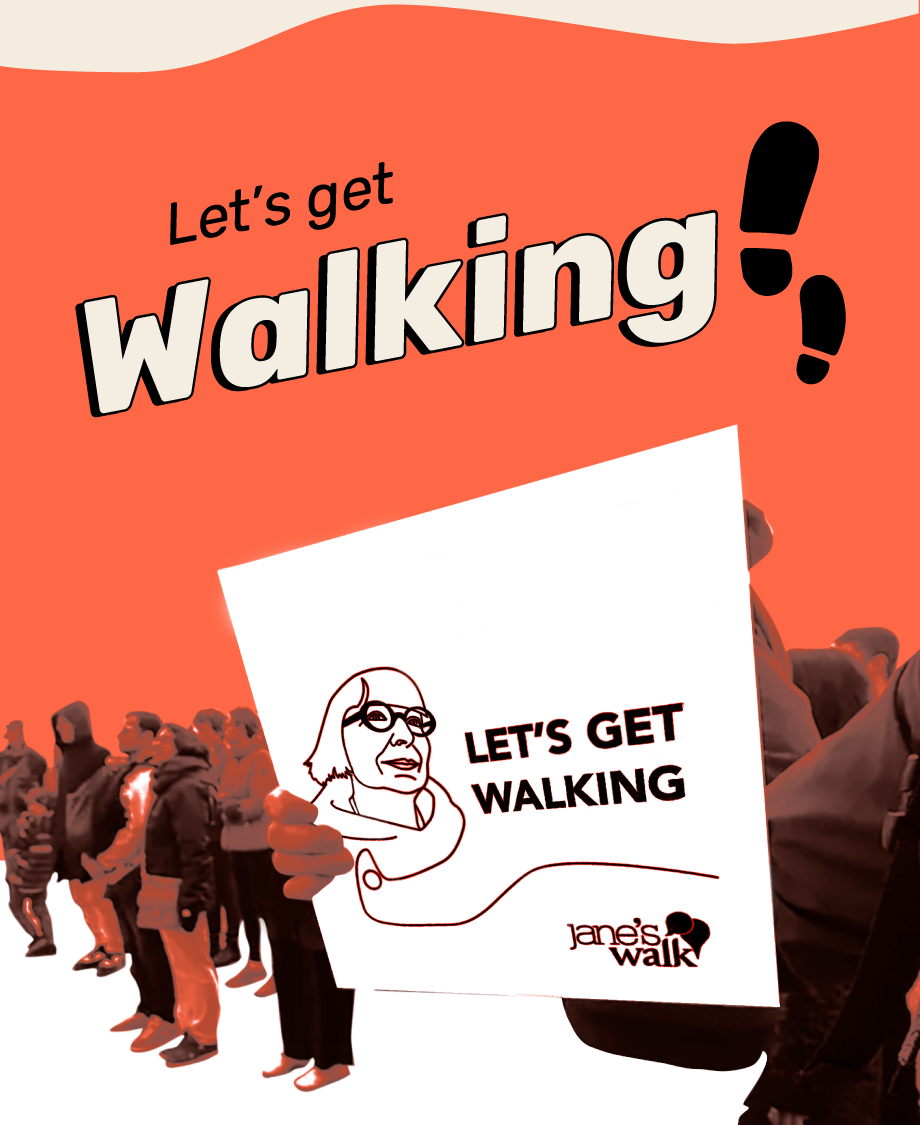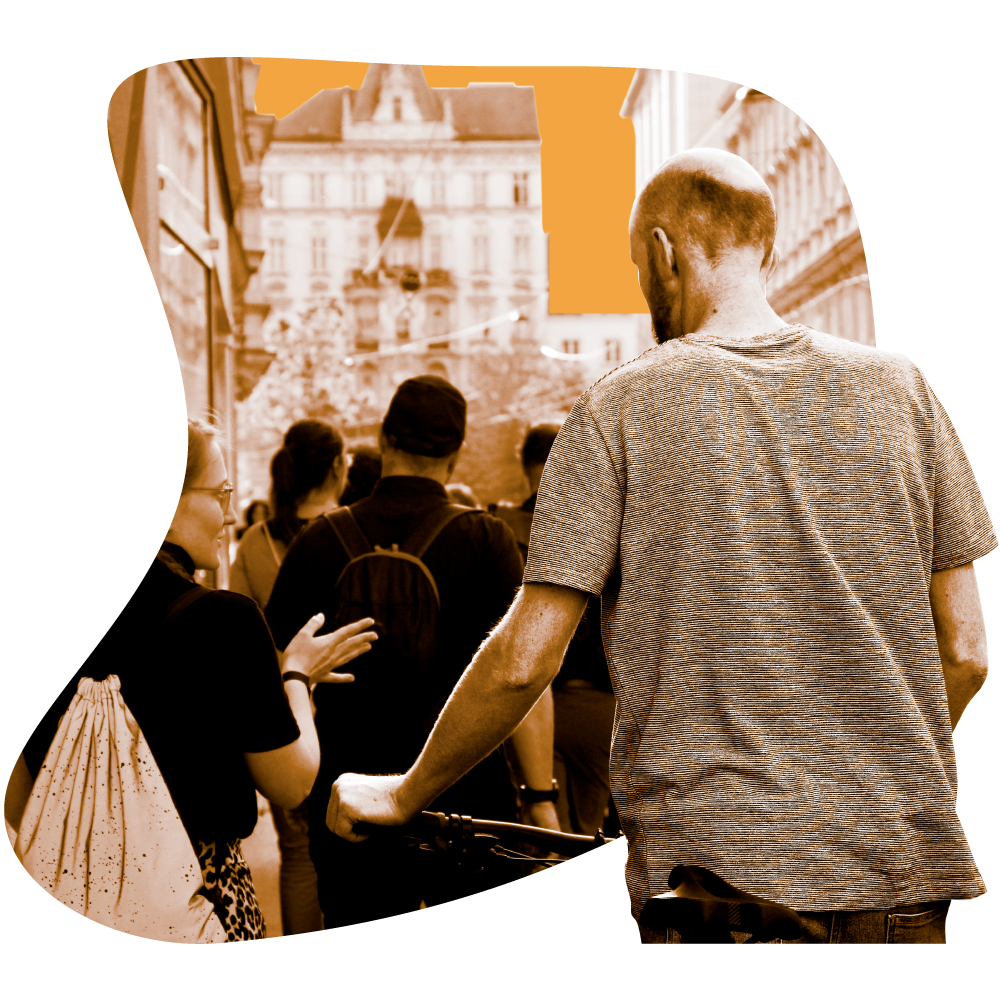
Jane’s Walk is a movement of free, citizen-led walking conversations inspired by Jane Jacobs.
Anybody can lead a Jane’s Walk!
The festival encourages people to share stories about their neighbourhoods, discover unseen aspects of their communities, and use the art of walking as a way to connect with their neighbours.
About Jane Jacobs
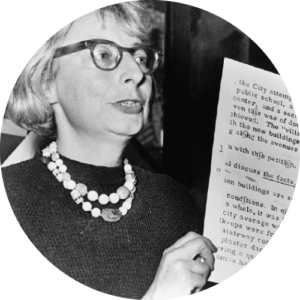
Jane Jacobs (1916-2006) was a writer, urbanist and activist who championed a community-based approach to city-building. She had no formal training as a planner, and yet her 1961 book, The Death and Life of Great American Cities, introduced ground-breaking ideas about how cities function, evolve, and fail that have become conceptual pillars for today’s architects, planners, policymakers, activists, and other city builders.
Jacobs lived in Greenwich Village until 1968 when she moved to Toronto. In both cities, she helped derail the car-centred approach to urban planning and invigorated neighbourhood and community activism.
Who We Are
Jane’s Walk was founded in Toronto in 2006 by a group of Jane Jacobs’ friends and colleagues as a way to honor her life and activate her ideas. That first year, there were a handful of walks in Toronto. Over the next decade, the movement saw rapid global uptake by urban activists around the world. In 2017, 1,700 Jane’s Walks took place in 225 cities around the world, spanning 37 countries and 6 continents. The movement continues to grow every year and has now reached over 500 cities!
About the Steering Committee
This website is maintained by the Jane’s Walk Steering Committee, an all-voluntary group governing Jane’s Walk Toronto and Jane’s Walk Global.
The Steering Committee is a global governance committee with members across Europe and Canada.
Many of the Steering Committee members are based in Toronto, where the first Jane’s Walk festival first launched in May 2007. The Jane’s Walk Steering Committee was formed by friends and family of Jane Jacobs by some of the folks who convened the original Jane’s Walks in 2006, after her passing, based on Jane’s principles of city-building.
Toronto is on the unceded territories of the Wendat, Haudenosaunee, the Anishinabeg, and the Mississaugas of the Credit people.
The Steering Committee is responsible for the organization, coordination and fundraising for the Toronto Jane’s Walk Festival each year.
Additionally, The Jane’s Walk Steering Committee stewards the global movement by fostering conversation among Jane’s Walk City Organizers, liaising with Jane Jacobs’ surviving family and friends, and providing guidance on the principles and practicalities of leading a Jane’s Walk with festivals and cities across the world.
The Jane’s Walk Steering Committee serves as an ambassador for Jane’s Walk, providing guidance and support to help communities grow and sustain their own local walks. Though we are a fully-volunteer committee – we aim to assist in capacity and network building, offering resources and expertise to ensure the success of festivals and events around the world.
The Global Jane’s Walk community is a non-hierarchical movement. The Steering Committee is not a central organizing authority, and we cannot provide funding for Jane’s Walk activities outside of Toronto.
Reach out to us if you have questions about Jane’s Walk at contact@janeswalk.net
Meet the Steering Committee
Adam Roy Cohoon
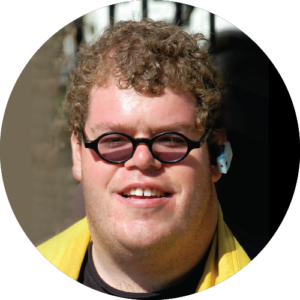
An artist with a disability living in Toronto and an accessibility advocate and tech tester. Adam uses technology and continues learning about technology and media to explore how they can make for a more exciting disability community. He has used technology in his artwork for many years to come up with compelling ideas creatively. Adam also actively advocates for creativity, innovation, and technology to bring wider accessibility to the arts for everyone. Adam has recently moved to the mobile realm and is learning how to use mobile smart technology to help bring more creativity and culture to the world.
Cassandra Alves

Cassandra is a multidisciplinary professional working at the intersection of urbanism, design, community engagement, and social/economic development. Over the past decade, she has contributed to diverse design studios and urban research organizations both in Toronto and internationally, such as UofT’s School of Cities, VTLA, SvN, Lanescape, The Laneway Project, and Planit (UK).
Currently, Cassandra serves as the Community Safety & Wellbeing Consultant for the City of Toronto’s 10-Year Community Safety and Wellbeing Plan (SafeTO) in partnership with the Downtown Yonge BIA. Here she focuses on place-based economic empowerment & development approaches through co-designing with communities. She is also a board member of The Laneway Project, where her deep passion for laneway revitalization, urban acupuncture, and tactile urbanism shines.
With a strong foundation in placemaking and community-driven change, Cassandra is dedicated to enhancing the wellbeing of Toronto’s neighbourhoods. She brings years of experience in engaging communities, fostering inclusive collaboration, and creating lasting, positive impacts through thoughtful co-design.
Carlos Aranha
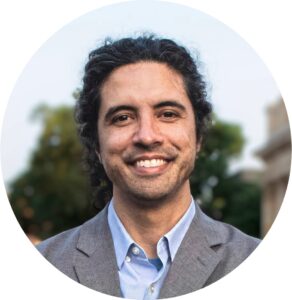
Carlos is a journalist and social psychologist whose focus lies in advocacy and policy-making. He comes from a 20-year career in PR, Marketing, and Partnerships, mostly at Google – with working experiences in Latin America, North America, and Asia.
In Brazil, he co-founded three nonprofits that work towards a more sustainable and democratic approach to public spaces and urban mobility, and was then elected for consecutive terms to the Urban Policy and the Traffic & Transport city councils in Sao Paulo (Pop. 12M), from 2015 to 2021.
Now based in Europe, Carlos left the private sector for a Masters in Public Policy at Oxford, following his passion for a new approach to the urban environment and his experience of championing the topic locally and internationally.
Celia Beketa

Celia Beketa is a design researcher who puts participatory and co-creation methods at the centre of her practice. She hopes to bring a human-centred lens to the design of just and equitable cities and challenge assumptions about who has a voice at the table for critical urban planning decisions. She acts as the ‘global co-chair’ of Jane’s Walk—she is currently pursuing her Masters in Urban Studies and over the next two years will be living in four cities across Europe. In her work at Doblin Canada, she helped private and public sector organizations better understand their users (for instance, customers, employees, or residents), and design their services around their needs. She was previously on the Steering Committee of the Toronto Public Space Committee. In her spare time you can find her either in the audience or on the stage of a community theatre production.
Claire Wang

Claire is an urban designer with a global perspective and a strong commitment to community engagement. She initiated Jane’s Walk in Shanghai and expanded it to over 10 cities across China, building a network of local leaders passionate about urban exploration. Since relocating to Toronto in 2023, she has continued to champion accessible, community-driven urban experiences. With extensive experience in master planning, architectural design, and placemaking, Claire advocates for human-centered design and community innovation. Currently an urban designer with the City of Toronto, she is also working on a book about the Jane’s Walk movement in China. Claire enjoys exploring diverse neighborhoods and observing the nuances of street life.
Eunice Wong
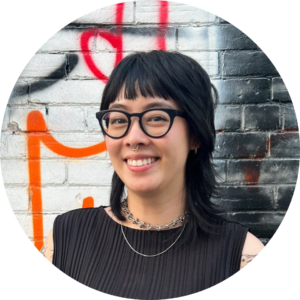
Eunice is an award-winning urban designer, researcher, registered planner, illustrator, studio instructor, and all-around curious person. They’re currently the Lead Researcher at Monumental – a Toronto-based, social purpose firm working to advance equitable urban development and inclusive city-building. Coming into this role, Eunice was most recently at architecture firm Perkins&Will as an associate and senior urban designer, with deep expertise in community engagement, land use planning, public realm design, built form testing, and transportation design. They also led various research efforts around gender equity, public space, public health, and as host of the Inhabit podcast.
Eunice is always thinking about the human experience and opportunities for storytelling, balancing both quantitative and qualitative design approaches. They are passionate about intersections—in human identities, between planning and people, urbanism and nature… and literally the design of intersections. Eunice lives in Toronto with their partner and very silly dog Peanut.
Jenny Foster
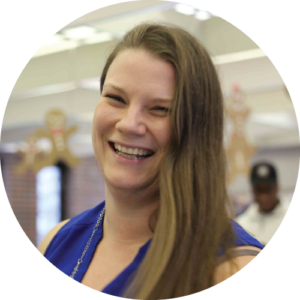
Jenny Foster loves her city, and has worked in the non-profit world for over 12 years. After being inspired at an early age by her grandmother, she has devoted her life to her community and has held fundraising roles across various sectors, including education, food security, social services, and politics. Currently Manager, Foundation Partnerships at CNIB. She also has a strong history of volunteerism. She held the role of Executive Director at West Hill Harvest, a local Scarborough charity, for over 10 years and currently sits on the Board of the Housing Help Centre. She is an avid reader and writer, and an award-winning yoga teacher. Jenny holds a BA in Political Science from The University of Toronto and a certificate in Fundraising Management from Seneca College, and is a Certified Fundraising Professional.
M. Alejandra Fajardo

Alejandra is an urban designer and founder of Embracce, a multidisciplinary agency specializing in marketing communications and facilitation. With a Bachelor of Architectural Studies in Urbanism from Carleton University, she integrates digital media, participatory engagement, and strategic storytelling to build meaningful connections and empower communities.
A strong advocate for green urban infrastructure, smart density, affordable housing, and multi-modal mobility, Alejandra believes in the transformative power of the public realm to shape healthy, vibrant, and resilient cities.
Beyond her professional work, she actively participates and volunteers with organizations dedicated to community building, cultural initiatives, and urban advocacy, reinforcing her commitment to equitable and sustainable urban development.
Priya Pinjani

Priya is an architect, academic and an urbanist. She is currently facilitating the development of two strategic plans for large Ontario school districts, community engagement for the City of Vaughan, and an international multi-city survey on child rights in sport. In her parallel design work, she navigates an expanded field of design in an attempt to understand its potential as a political, social, economic, technological and spatial practice. Her creative spatial practice ranges over various scales and media, with some notable projects exhibited at a national exposition, museum and web series. Priya brings 8+ years of experience between industry and academia, and is an alumnus of the Fulbright Program, Parsons School of Design, and Indus Valley School of Art and Architecture. She is new to Toronto, keen to learn of its neighborhoods by moving through them and interacting with communities. She communicates fluently in English, Urdu, Hindi and Sindhi.
Sarah Luca
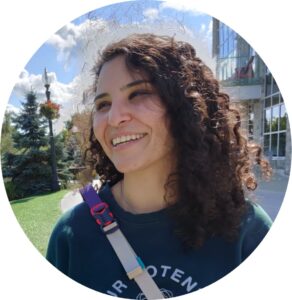
Sarah is equal parts community builder and explorer with a strong background in community development approaches and a strong passion for facilitating meaningful engagement. Sarah has a professional background in the non-profit sector, having worked with organizations that support grassroots organizing and cross-sector collaborations and networking. When not working, you can find her exploring parks and greenspaces as a hike guide and leader, encouraging accessibility and representation in outdoor spaces.
Susan Johnston
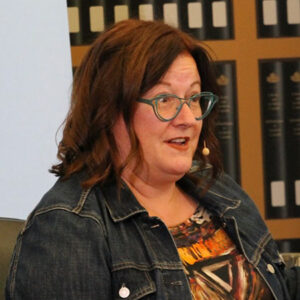
Susan is passionate about dialogue, and creating new spaces for people to learn and collaborate on topics they care about. She lives with her family in Centretown, Ottawa. Susan has hosted arts radio programs on CKCU FM since 1999. She’s part of the Board of Directors at Synapcity, an Ottawa organization bringing together people and institutions, sharing tools to make Ottawa more beautiful, diverse, and prosperous. She has worked with Community Mediation Ottawa and the Canadian Institute for Conflict Resolution to help people and groups strengthen their capacity to talk through and learn from their differences. In 2014, she co-founded Ottawa (de)tours, a social enterprise with a mandate to help people explore and discuss contemporary issues, which operated for six seasons. She is passionate about using radio, storytelling, and walking to help people deepen their relationship with the Ottawa River, as a landmark central to her community’s history and present-day life. Find her on CKCU 93.1 FM | ckcufm.com early on Friday mornings.
Talia Kaufman
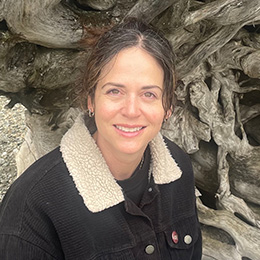
Originally from Calgary, Talia is a passionate advocate for equal access to public space, sports and recreation. She has 18 years of experience in program design, training and facilitation in the non-profit sector. Talia has a Master’s in Education from Queen’s University in Ontario, with a focus on Indigenous education, and conducted research on designing equitable and decolonised youth leadership programs. She is involved with promoting safe access to sport in public spaces through her volunteer work with Pushing Against Racism, SSHRED (Skateboarding, Sustainability, Health, Research, Environmental Design), and the Peniche Skatepark Association, which she co-founded in Portugal, where she has been putting down roots since 2020. Her professional experience includes developing play-based curriculum for youth in places as varied as Afghanistan, Canada, Cambodia, Malawi, Mozambique and South Africa. In March 2025, Talia started in a new role as Senior Programmes Manager with the International Platform for Sport and Development.
Wesley Reibeling
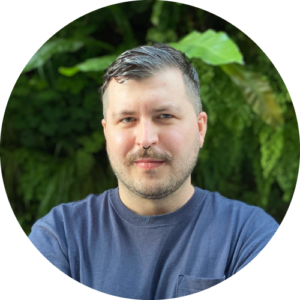
Wesley Reibeling is a multidisciplinary artist, urbanist, and cultural strategist based in Toronto. Wesley is the outgoing co-chair of Jane’s Walk Toronto and Jane’s Walk Global, At Park People, Wesley is the Program Manager of Toronto Networks and Partnerships where he works closely with community park groups, NGOs and the City of Toronto.
Wesley works at the intersection of arts, culture, equity, and urbanism. His expertise spans public engagement, placemaking, municipal consultation, and cultural programming, emphasizing how cities should be shaped by lived experiences rather than top-down planning. Wesley is an advocate for queer public spaces and worked locally and internationally on supporting queer placemaking and has collaborated with organizations like Imagine Cities, Urban Minds, PlacemakingX and Placemaking Canada, Project for Public Spaces, and the High Line Network to foster more democratic, inclusive city-making.
Beyond their organizational roles, Wesley is a thought leader, writer, and creative practitioner who explores how public space, storytelling, and cultural activation can drive climate adaptation, resilience, and community care. His work increasingly focuses on supporting historically marginalized communities, and advancing cultural strategies that challenge extractive engagement models.
Principles Guiding the Walk
Jane’s Walk is a global movement with nearly 500 participating cities. It’s a little different in each city, but these 6 principles are the common framework for Jane’s Walks everywhere.
Jane’s Walk…
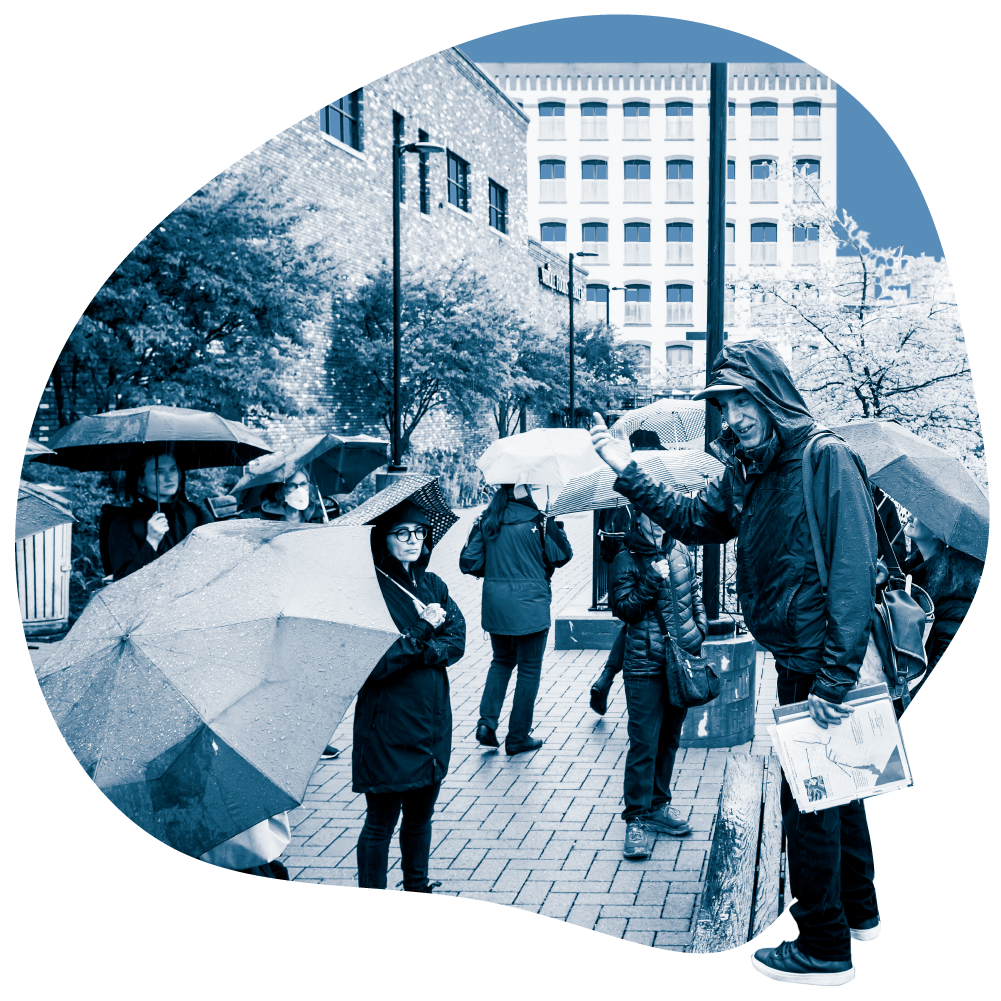
1. Is volunteer-driven

Jane’s Walk is a volunteer-led movement powered by the communities in which it operates. Anybody can lead a Jane’s Walk, and participation is always free. While the Global Festival takes place annually on the first weekend of May (close to Jane Jacobs’ birthday on May 4th), Jane’s Walks can be led at any time. Local financial support of Jane’s Walks is permitted, but no fees, charges, or any promotion of commercial activities can be connected to the content or activities of any given walk.
2. Is inspired and informed by the world around us

Jane’s Walks are a way for neighbours to meet neighbours, and for neighbourhoods to build community. Jane’s Walk strives to include a wide array of voices and ideas in discussions about cities, neighbourhoods and community engagement. Jane’s Walk is different from other initiatives because the community and its buildings, parks, and broader environment are also active players in the walks. They inspire, frustrate, inform, and direct participation in the conversations. They inspire, frustrate, inform, and direct participation in the conversations.
3. Is done in whatever way makes sense for you

There is no ‘one way’ to lead a Jane’s Walk or run a Festival. For both cities and individuals, Jane’s Walk is a tool to create and encourage conversation. Jane’s Walks take place on foot, through other forms of mobility, through performance, or virtually. The design is intentionally open, serving as a global container for ideas, exploration, and discovery.
4. Creates an opportunity to hear all voices

Jane’s Walk creates a space where community members with different viewpoints can share their perspectives. As a platform for these voices to be heard, Jane’s Walk directly addresses and takes a stance against hate speech, racism, xenophobia, oppression, and discrimination.
5. Encourages critical engagement with the ideas and legacy of Jane

Jane’s Walk was created in recognition of the ideas and legacy of Jane Jacobs, who has inspired and influenced city builders for decades. The intent of Jane’s Walk is not to prescribe her teachings on city-making and urban planning but rather to promote dialogue, discussion and debate on them.
6. Recognizes cities are living ecosystems with a past, present and future

Jane’s Walk encourages reflection about the history of habitation and city-building.
Jane’s Walks can prompt questions about who has been displaced or marginalized in
a particular space, in a critical, investigative way. They can inspire dialogue on ways
of moving toward greater equity, together.
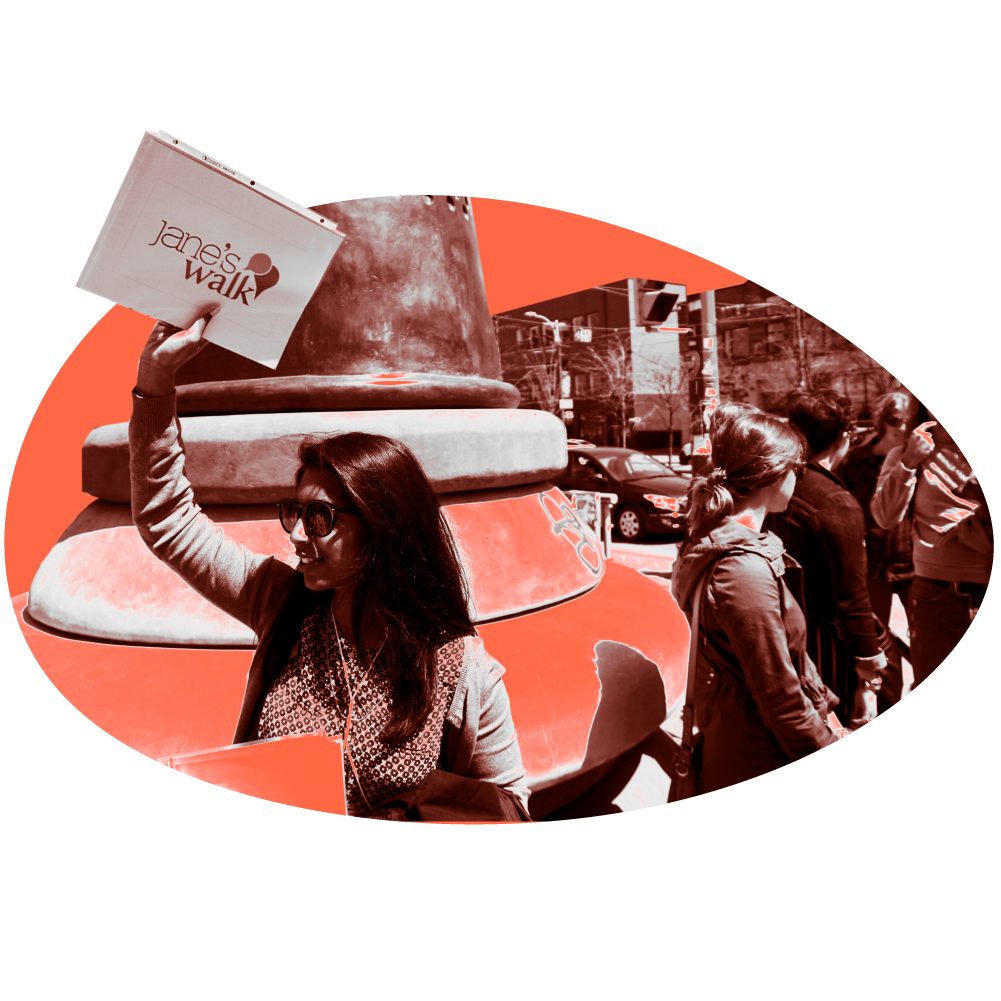
Get involved in Jane’s Walk
Jane’s Walks are supported, organized, and led by volunteers around the world.

